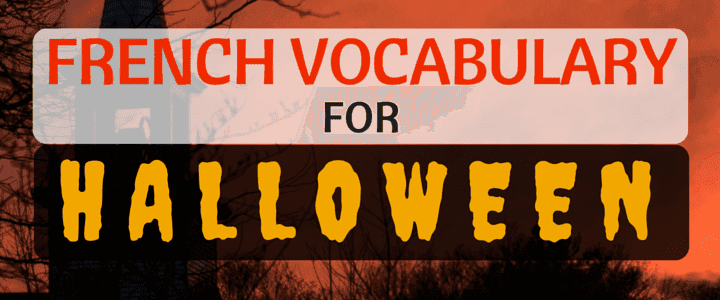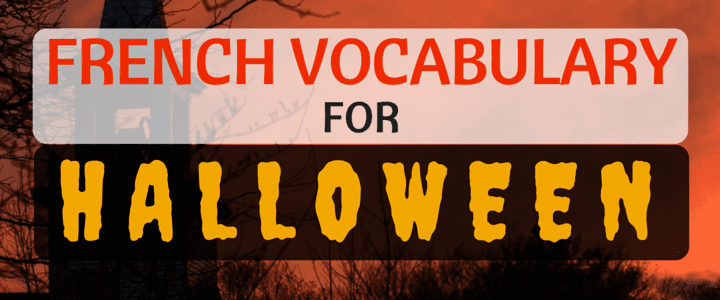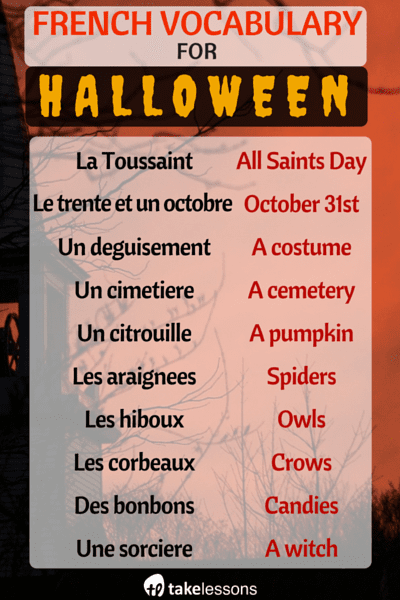Have you gotten your costume and spooky playlist ready for Halloween yet? How about your French vocabulary? In this article, teacher Annie A. gives you a lesson in French Halloween history and teaches you 10 words you’ll want to use this October…
The History of Halloween in France
Did you know the French didn’t begin celebrating Halloween until sometime in the early 1990s?
Halloween is not a traditional French festival; as a matter of fact, it’s an American import. The French love costume parties and fun activities, especially the young fashionable crowds, so in the 1990s they adopted Halloween. As Halloween became more popular, parents started to enjoy and share these activities with their children.
Nowadays, French shops use images of Halloween in their advertisements. It’s gotten so popular that Halloween’s seasonal sales are just behind Christmas and New Year.
Halloween Activities in France
School teachers take advantage of the Halloween celebration as an opportunity to teach their students material in fun ways through costume parties and trick-or-treating (children are obviously very motivated by candy).
Pastry chefs and chocolatiers also like to decorate their goods with a spooky touch and renovate their stores accordingly for Halloween in France.
Around forty minutes west of Paris there’s a farm called la ferme de Gally with a pumpkin patch that provides carving tools and manuals to create your own jack-o’-lanterns.
Disneyland Paris celebrates Halloween by inviting its guests to spooky events and decorating Main Street with the same theme.
The city in France which embraces Halloween most warm-heartedly is Limoges in west-central France. Since 1996, Limoges has organized a Halloween parade every year with around 80,000 participants, all in ghoulish costumes carrying candlelit pumpkins. Special Halloween parties are commonly held in restaurants, cafés, and bars.
The Days After Halloween
The traditional French Catholic holiday of Toussaint follows Halloween on November 1st – it’s called All Saints Day in English-speaking countries.
The Catholic Church has designated November 1st to commemorate all the known and unknown Christian martyrs. On this day, the French visit cemeteries, bring chrysanthemums, and pray to their dead relatives and favorite saints.
The next day, November 2nd, is le jour des morts (the Day of the Dead), and it’s for the dead within the family.
Halloween is originally an Anglo-Celtic celebration derived from “All Hallow’s Eve” of All Saints Day. In northern rural areas of Brittany, children used to carve eyes, a nose, and a mouth out of beetroots and place a candle inside. They would put their finished product in windows to scare passersby at night.
French Criticisms of Halloween
Some French people think the festivities on the eve of Toussaint show a lack of respect for the dead.
Others think that American cultural values have overtaken the French ones. They think that corporate and commercial interests have won over the old French traditions.
Subsequently, since 2006, Halloween festivities have slowed down and it still remains to be seen if Halloween is a fad or a permanent fixture in France.
Halloween Words in French
In order for you to have your own Halloween celebration with the French in mind, here are 10 words you can practice and use in October!
1) La Toussaint – All Saints Day
2) Le trente et un octobre – October 31st
3) Un deguisement – A costume
4) Un cimetiere – A cemetery
5) Un citrouille – A pumpkin
6) Les araignees – Spiders
7) Les hiboux – Owls
8) Les corbeaux – Crows
9) Des bonbons – Candies
10) Une sorciere – A witch
Take the words that you’ve learned above and make a few sentences with them. If you can use all of the words in meaningful sentences, congratulations!
The learning doesn’t need to stop there, however; check out all of these French language resources to improve your comprehension today. In the midst of working hard, don’t forget to have some fun as well!
For more help improving your French language skills, work with a qualified private tutor. French tutors are available to work with you in-person or online depending on your location. Find your French tutor today!
 Post Author: Annie A.
Post Author: Annie A.Annie A. is a French instructor whose lessons are conducted exclusively online. Teaching for the past 12 years, she found her passion for the language while studying in Paris as a teenager. Learn more about Annie here!
Megan L.



